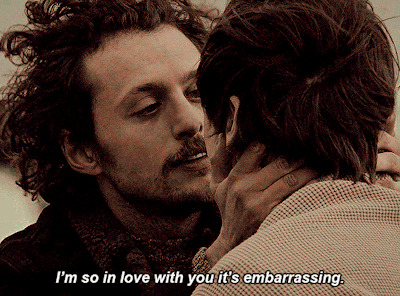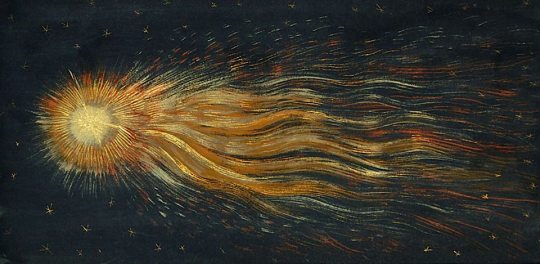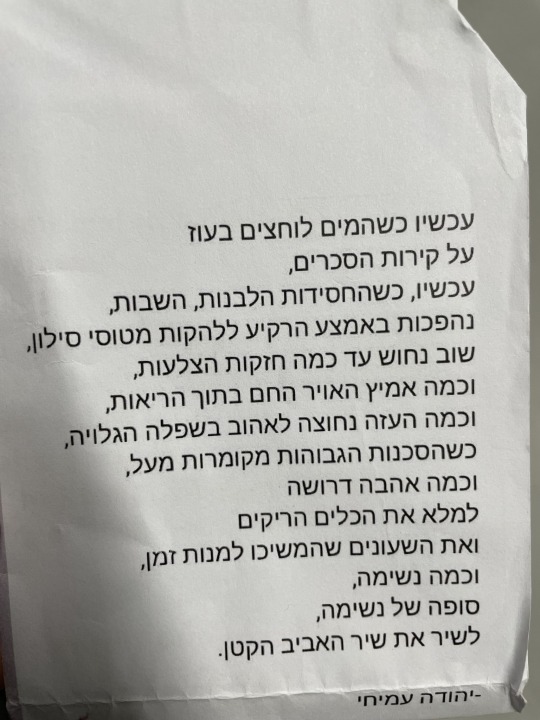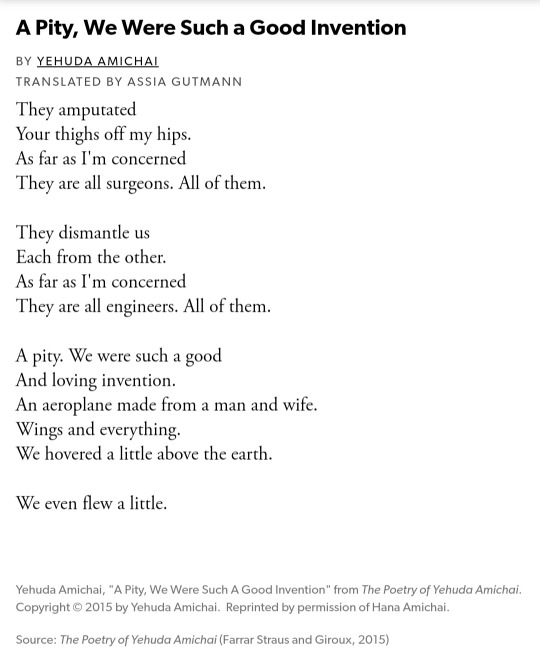#yehuda amichai
Explore tagged Tumblr posts
Text

Yehuda Amichai, from Selected Poetry of Y. Amichai; “The End of Elul,” (edited)
#lit#yehuda amichai#summer#poetry#words#the end of elul#fragments#writings#quotes#poetry selection#p
2K notes
·
View notes
Text
The crescent moon fits the line of your cheek.
Yehuda Amichai, from The Selected Poetry of Yehuda Amichai; “Six Poems for Tamar”
#deep thoughts#poem#poetry#life quotes#quotes#life quote#beautiful quote#deep feelings#deep love#love poems#dark academia#love#lovers#moon#heartfelt#spilled thoughts#poems and quotes#poems and poetry#poetic#soulful#soulmates#adoration#gânduri#romantic#romance#yehuda amichai#adorable#intimate#intimacy#craving you
60 notes
·
View notes
Text
A Man in His Life
by Yehuda Amichai
A man doesn’t have time in his life to have time for everything. He doesn’t have seasons enough to have a season for every purpose. Ecclesiastes Was wrong about that.
A man needs to love and to hate at the same moment, to laugh and cry with the same eyes, with the same hands to throw stones and to gather them, to make love in war and war in love. And to hate and forgive and remember and forget, to arrange and confuse, to eat and to digest what history takes years and years to do.
A man doesn’t have time. When he loses he seeks, when he finds he forgets, when he forgets he loves, when he loves he begins to forget.
And his soul is seasoned, his soul is very professional. Only his body remains forever an amateur. It tries and it misses, gets muddled, doesn’t learn a thing, drunk and blind in its pleasures and its pains.
He will die as figs die in autumn, Shriveled and full of himself and sweet, the leaves growing dry on the ground, the bare branches pointing to the place where there’s time for everything.
516 notes
·
View notes
Text

50 notes
·
View notes
Text


“Look, just as time isn't inside clocks love isn't inside bodies: bodies only tell the love.”






Malex- for @befitandchase
Roswell New mexico 4x11/Archilochos translated by Anne Carson, in “Eros the Bittersweet”/Yehuda Amichai/Roswell New Mexico/Kazuo Ishiguro, Klara and the Sun/Franz Kafka, Letters to Milena/Hieu Minh Nguyen, from “Nguyen”, Not Here/Roswell,New Mexico 3x08
Credits to gifs and quotes found: @weltenwellen @kendallroycos @metamorphesque @flowerytale @bisexualalienss
#web weaving#roswell new mexico#malex#michael guerin#alex manes#love#kazuo ishiguro#anne carson#translations#yehuda amichai#poetry#franz kafka#hieu minh nguyen#Mine
54 notes
·
View notes
Text

From The Book of Miracles (Augsburger Wunderzeichenbuch), c. 1550. Source
* * * *
Love is not the last room: there are others after it, the whole length of the corridor that has no end. - Yehuda Amichai
[alive on all channels]
32 notes
·
View notes
Text
You are beautiful, like prophecies, and sad, like those that come true, calm, like the calmness afterward. Black like the white loneliness of jasmine. With sharpened fangs: she wolf and queen.
— Yehuda Amichai, Love poems: A Bilingual Edition, (1981)
75 notes
·
View notes
Text
The Diameter of The Bomb - Yehuda Amichai
The diameter of the bomb was thirty centimeters and the diameter of its effective range about seven meters, with four dead and eleven wounded. And around these, in a larger circle of pain and time, two hospitals are scattered and one graveyard. But the young woman who was buried in the city she came from, at a distance of more than a hundred kilometers, enlarges the circle considerably, and the solitary man mourning her death at the distant shores of a country far across the sea includes the entire world in the circle. And I won’t even mention the crying of orphans that reaches up to the throne of God and beyond, making a circle with no end and no God.
11 notes
·
View notes
Text

6 notes
·
View notes
Text

Yehuda Amichai, from Selected Poetry of Yehuda Amichai; “Solomon Waits,”
867 notes
·
View notes
Text
You are silent, like prophecies, and sad, like those that are fulfilled, calm, like the calmness afterward.
Yehuda Amichai, opening lines to Majestic love song
in Amen (tr. Ted Hughes, Oxford University Press 1978)
I'm not sure I have the correct punctuation for this particular translation – happy to be set straight...
30 notes
·
View notes
Text
The Greatest Desire
Instead of singing Hallelujah, a curtain fluttering from an open window.
Instead of saying Amen, a door or a shutter closing. Instead of the Vision of the End of Days the flapping of banners on an empty street after the holiday.
Reflections slowly take over the house, whatever glimmers in mirror and wineglass.
I saw broken glass flashing in the sun in the Judean desert, celebrating a wedding without bride or bridegroom, a pure celebration.
I saw a big beautiful parade going by in the street, I saw policemen standing between the spectators and the parade, their faces toward those who were watching, their backs to whatever was passing by with fanfare and joy and flags. Maybe to live like that.
But the greatest desire of all is to be in the dream of another person. To feel a slight pull, like reins tugging. To feel a heavy pull, like chains.
Yehuda Amichai, tr. Chana Bloch and Stephen Mitchell, The Selected Poetry of Yehuda Amichai (University of California Press, 1996)
#poetry#yehuda amichai#chana bloch#stephen mitchell#the greatest desire#the selected poetry of yehuda amichai#translation
3 notes
·
View notes
Text

6 notes
·
View notes
Text

7 notes
·
View notes
Text

Poem Without an End
"Inside the brand-new museum/ there's an old synagogue./ Inside the synagogue/ is me./ Inside me/ my heart./ Inside my heart/ a museum./ Inside the museum/ a synagogue,/ inside it/ me,/ inside me/ my heart,/ inside my heart/ a museum."
The Poem Without an End, the selected poetry of Yehuda Amichai, Yehuda Amichai
5 notes
·
View notes
